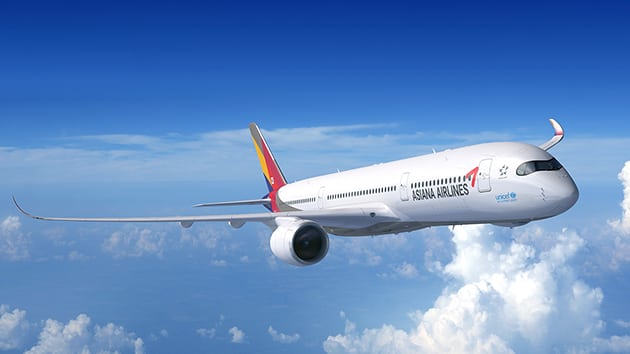
To help airlines effectively manage larger data transmissions from the new Airbus A350 XWB aircraft-to-ground systems, Rockwell Collins has introduced a higher bandwidth, cost-efficient messaging service. The ARINC GLOBALink A350 Media Independent Aircraft Messaging service will launch on Asiana Airlines this month. Photo courtesy of Rockwell Collins
Airbus A350 operators received some of the most important avionics news of 2017 on the first day of the biannual Paris Air Show, as Rockwell Collins has introduced a new conversion method for Aircraft Communications Addressing and Reporting System (ACARS) data packets.
The new service, called ARINC GLOBALink A350 Media Independent Aircraft Messaging (MIAM), currently is only available for the A350. Asiana Airlines was unveiled to be the launch customer.
Rockwell Collins enabled the new conversion method within its own ACARS global network, which it has been operating since purchasing the subscription-based air-to-ground data transfer network from ARINC in 2013.
Airlines including Hawaiian Airlines and Air France have been asking for a replacement or alternative to ACARS for several years, as new data-intensive aircraft like the A350 and Boeing 787 are capable of emitting data packets much larger than the network was designed to handle when it was first introduced in the late 1970s. According to Michael DiGeorge, VP of commercial aviation for Rockwell Collins, the service can convert ACARS MIAM messages to any protocol, allowing interoperability with airline, aircraft and engine manufacturers’ ACARS host and end systems.
Using the service, airlines can send IP MIAM data over the cellular, Wi-Fi and broadband SATCOM providers of their choice and reach their intended destination. The GLOBALink service converts A350 IP data to any ground protocol or message format, allowing interoperability with any existing host and end system thereby saving airlines potentially significant investments in new additional ground systems, DiGeorge said.
“Within our network, we’ve enabled this conversion,” DiGeorge told Avionics. “We can convert the protocol to talk to their back end systems. There’s many different protocols, and this is a translator. It will take large messages that today ACARS can’t handle. ACARS can only handle up to about 100 kilobits.”
The new GlobalLink service compresses ACARS messages, and encodes and translates them to any protocol that Asiana or any other A350 operator chooses to use globally. One of the biggest advantages of the new conversion method is that airlines do not have to make any avionics modifications to enable it.
“This service allows us to continue relying on ACARS while taking advantage of higher bandwidth IP communications on our A350 fleet,” said Seok Nam Goh, CIO at Asiana Airlines.
According to DiGeorge, the new service can handle the conversion. Cellular, gate link and airport Wi-Fi are also available when the aircraft lands.
“If you think about it with these new smart aircraft there’s vast amounts of data on that aircraft probably 10 times the amount of data that’s on a traditional aircraft, so the data coming off is really to support EFB applications or aircraft health maintenance applications,” said DiGeorge.